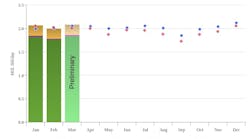Appeals from the US Congress for energy conservation should be greeted warily. When politicians say "conserve," they too frequently mean "don't drill for oil and gas." A May 27 letter to Energy Sec. Spencer Abraham from 30 Democratic senators deserves this suspicion.
The senators expressed justifiable alarm over conditions in the natural gas market. They properly commended Abraham for calling an emergency meeting of the National Petroleum Council to address gas supply. They realistically raised doubt that supply can reach needed levels later this year. Then the analysis began to crumble.
"Energy efficiency and conservation, as well as fuel-switching, are more likely [than new supply] to make a difference in natural gas markets this summer and next winter," the letter said. So far so good. Then this: "Analysis of the successful efforts of California to reduce electricity consumption in 2001 demonstrated that efficiency and conservation were the fastest and least costly solutions available."
Poor regulation
Incredible. California's government wrecked the state's energy market with price controls and other manipulations then bought its way out of jeopardy with borrowed money—lots of borrowed money. At the heart of the problem was chronic political resistance to development of supply. Yes, greedy energy traders took advantage of the mess. But they didn't cause it, as state officials allege. Poor regulation did.
California, in fact, is the worst-case scenario where energy is concerned. To hold it up as an example for the rest of the country is laughable. Those "least costly solutions" helped create the worst fiscal crisis in California's history. Successful efforts? No way.
The senators are correct about efficiency, conservation, and fuel-switching. They just don't need to do anything to make them happen. The market is ahead of them. And it hurts.
The US petrochemical industry, already struggling with overcapacity born of low demand and recent plant start-ups, has lost its international competitiveness because of high feedstock and energy costs. Operating rates have dropped, and plant closures are likely. Other energy-intensive manufacturers suffer from the elevated energy costs.
So conservation, in the sense of diminished consumption, is well under way in parts of the market. It comes at the expense of economic activity. And it's partly masked in demand totals by weather-related consumption gains elsewhere.
Fuel-switching is under way, too. Through mid-May, average demand for residual oil, a gas substitute under some boilers, was 9% higher than it was in through mid-May 2002. Substitution for gas also might account for part of distillate's year-to-date demand gain of 8%.
When Democratic senators say "fuel-switching," however, they tend not to mean oil. They tend to mean renewable energy.
Seasoned observers thus can't help but suspect that the senatorial letter to Abraham is just a veiled reassertion of an overworked feint in energy policy-making. When the solution is to put metal to earth and develop supply—whether it's drilling for oil and gas or building a power plant—obstructionists unfurl the conservation and renewable-energy distractions. Both aims sound great—and they are. But they don't add up to enough new supply or diminished consumption to meaningfully displace oil and gas or the imperative to drill.
US drilling, as the Democratic senators point out, is up over its moribund levels of last year. It's too early to claim, as the senators do, that the effort won't yield significant amounts of new supply. But it's not too early to insist that more drilling needs to occur—especially on promising federal land now off-limits to producers.
The country has reencountered limits to its producing industry's ability to supply the gas market. The limits are political rather than geologic. Federal oil and gas leasing no longer happens off the East or West Coasts or in most of the eastern Gulf of Mexico. Promising onshore acreage in the West is either unleasable or inaccessible due to onerous stipulations and permitting delays.
Exaggerated fears
The US deliberately produces less gas than it can and less than it needs because of ridiculously exaggerated environmental fears. Especially with the economy staggering, this is inexcusable.
Behind this underperformance are hostilities toward supply and urges to regulate that make some politicians look Californian. The last thing Americans should hope is that their energy markets ever look that way, too.
